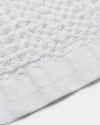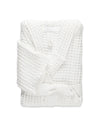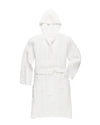Education
What Are Enzyme Detergents & How Do They Work?
Published
August 14, 2024
Reviewed by
Suze Dowling

In the hustle and bustle of daily life, it feels good to check off tasks from our to-do lists. So, it can be frustrating when we pull that last load of laundry from the dryer only to realize that clothes, towels, or bedding didn’t turn out as clean and fresh as we’d hoped. Let’s face it: who has time to wash everything a second time?
Well, if this sounds familiar, you just might find today’s article helpful and interesting. We’ll take a look at enzyme detergents, exploring what they are and how they work to revolutionize the way we approach laundry care.
By understanding the science behind enzyme detergents, you can unlock the secrets to achieving cleaner and fresher laundry with ease — no second wash necessary!
What Are Enzymes?
Enzymes are biological molecules that act as catalysts in chemical reactions, accelerating the rate at which these reactions occur. In biological processes, enzymes are known for their specificity and efficiency in targeting particular substances.
Enzymes bind to specific molecules, known as substrates, and help break them down into smaller components. This process helps to effectively remove stains and dirt from fabrics during the washing cycle.
The enzymes used in detergents are typically derived from natural sources and are tailored to target specific types of stains commonly found on clothing. One of the key characteristics of enzymes is their ability to work under mild conditions, such as lower temperatures, which makes them ideal for use in laundry detergents.
By harnessing the power of enzymes, detergent manufacturers can create products that deliver superior cleaning performance while reducing the need for harsh chemicals that can be detrimental to both fabrics and the environment.
What Are Enzyme Detergents?
Enzyme detergents represent a specialized category of laundry cleaning products that incorporate enzymes into their formulation to enhance stain removal capabilities. Unlike traditional detergents that rely solely on surfactants to lift dirt and stains from fabrics, enzyme detergents leverage the power of biological catalysts to target specific types of stains effectively.
The incorporation of enzymes in detergent formulations allows for more efficient cleaning, as each enzyme is tailored to break down a particular type of stain. Common enzymes found in enzyme detergents include proteases, which break down protein-based stains like blood and grass; amylases, which target carbohydrate-based stains like starch and chocolate; and lipases, which work on lipid or fat-based stains like oils and grease.
Enzyme detergents are designed to work alongside surfactants to provide a comprehensive cleaning solution that tackles a wide range of stains. By utilizing enzymes in laundry detergents, consumers can achieve superior cleaning results and maintain the quality of their clothing without excessive scrubbing or pre-treatment.
How Do Enzyme Detergents Work?
Enzyme detergents operate on the principle of enzymatic cleaning, a process that involves the breakdown of complex stains into simpler, more soluble substances. When enzyme detergents are introduced to a soiled garment during the washing cycle, the enzymes target specific molecular bonds within the stain molecules, initiating a chemical reaction that leads to their disintegration.
Advantages of Using Enzyme Detergents
Enzyme detergents offer a multitude of benefits that make them a preferred choice for many households seeking efficient and eco-friendly cleaning solutions.
Some of the key advantages of using enzyme detergents include:
- Enhanced Cleaning Power: Enzymes in detergent formulations target specific types of stains, resulting in more effective removal than traditional detergents.
- Color Preservation: Enzyme detergents are gentle on fabrics, helping to maintain the vibrancy of colors and reduce the risk of fading or damage.
- Eco-Friendly: Enzymes are biodegradable and environmentally friendly, making enzyme detergents a sustainable choice for those concerned about the impact of cleaning products on the environment.
- Effective in Cold Water: Enzymes work efficiently even in cold water, reducing energy consumption associated with heating water for laundry.
- Versatility: Enzyme detergents are versatile and can effectively remove a wide range of stains, making them suitable for several fabrics and laundry loads.
By harnessing the power of enzymes, detergent manufacturers have developed products that deliver superior cleaning performance and align with the growing demand for greener and more sustainable cleaning solutions.
Challenges and Limitations
While enzyme detergents offer numerous advantages, there are also certain challenges and limitations associated with their use that consumers should be aware of:
- Allergic Reactions: Some individuals may be sensitive or allergic to certain enzymes used in detergent formulations, leading to skin irritation or allergic reactions upon contact with treated fabrics.
- Fabric Compatibility: Enzyme detergents may not be suitable for all types of fabrics, particularly delicate or specialty fabrics. It is essential to check fabric care labels and follow manufacturer recommendations when using enzyme detergents.
- Residual Enzymes: In some cases, traces of enzymes may remain on clothing after washing, potentially causing skin irritation in individuals with enzyme sensitivities. Thorough rinsing and proper dosage of detergent can help mitigate this issue.
- Storage and Stability: Enzyme detergents require proper storage conditions to maintain their effectiveness. Exposure to high temperatures or prolonged storage can degrade the enzymatic activity of the detergent.
To overcome these challenges and limitations, consumers can consider factors like selecting enzyme detergents designed for sensitive skin, conducting spot tests on fabrics, following recommended quantities, and storing detergents in a cool, dry place to ensure optimal performance and minimize potential risks associated with enzymatic cleaning.
Tips for Using Enzyme Detergents Effectively
To maximize the efficiency and effectiveness of enzyme detergents in your laundry routine, consider the following tips for using them effectively:
- Follow Instructions: Use the recommended amount of enzyme detergent based on the load size and level of soil to ensure optimal cleaning performance without wastage.
- Pre-Treat Stubborn Stains: For tough stains, consider pre-treating with a small amount of enzyme detergent before washing to enhance stain removal effectiveness.
- Choose the Right Temperature: Enzyme detergents work in a wide range of temperatures, but for best results, follow the manufacturer's recommendations for temperature settings based on the type of stains and fabrics.
- Separate Laundry Loads: Sort laundry into different loads based on fabric type, color, and level of soiling to prevent color bleeding and ensure thorough cleaning with enzyme detergents.
- Use Cold Water Wisely: While enzyme detergents are effective in cold water, consider using warm water for heavily soiled items to boost cleaning power when needed.
- Avoid Overloading the Machine: Overloading the washing machine can hinder the detergent's ability to reach all fabric surfaces, leading to ineffective cleaning. Follow load size recommendations for optimal results.
By incorporating these simple yet effective tips into your laundry routine, you can harness the full potential of enzyme detergents and achieve cleaner, fresher clothes with ease.
Harnessing Enzyme Detergents for Towel Care
Embracing enzyme detergents in your laundry routine can transform the cleanliness of your clothes and extend benefits to your towels. At Onsen, we offer quality products meant to last, so it makes sense to give them the best care possible.
Our Waffle towels are made from 100% Supima cotton and are designed to dry faster and resist mildew. Adding enzyme detergents to your laundering routine can help maintain the quality of your towels by efficiently breaking down stains and odors.
Want to extend that care even further? Check out our Wool Dryer Balls that help keep your towels soft and fluffy without chemical additives. Here’s to ensuring your towels remain fresh, clean, and in excellent condition.
Sources:
Which Laundry Enzymes Work Best? | Science in School
ACI, Trades Unveil New Factsheet on the Role of Enzymes in Detergent Products | Cleaning Institute
The Cold Wash Challenge: Testing How Well Enzymes Work in Laundry Detergents | Science Buddies











